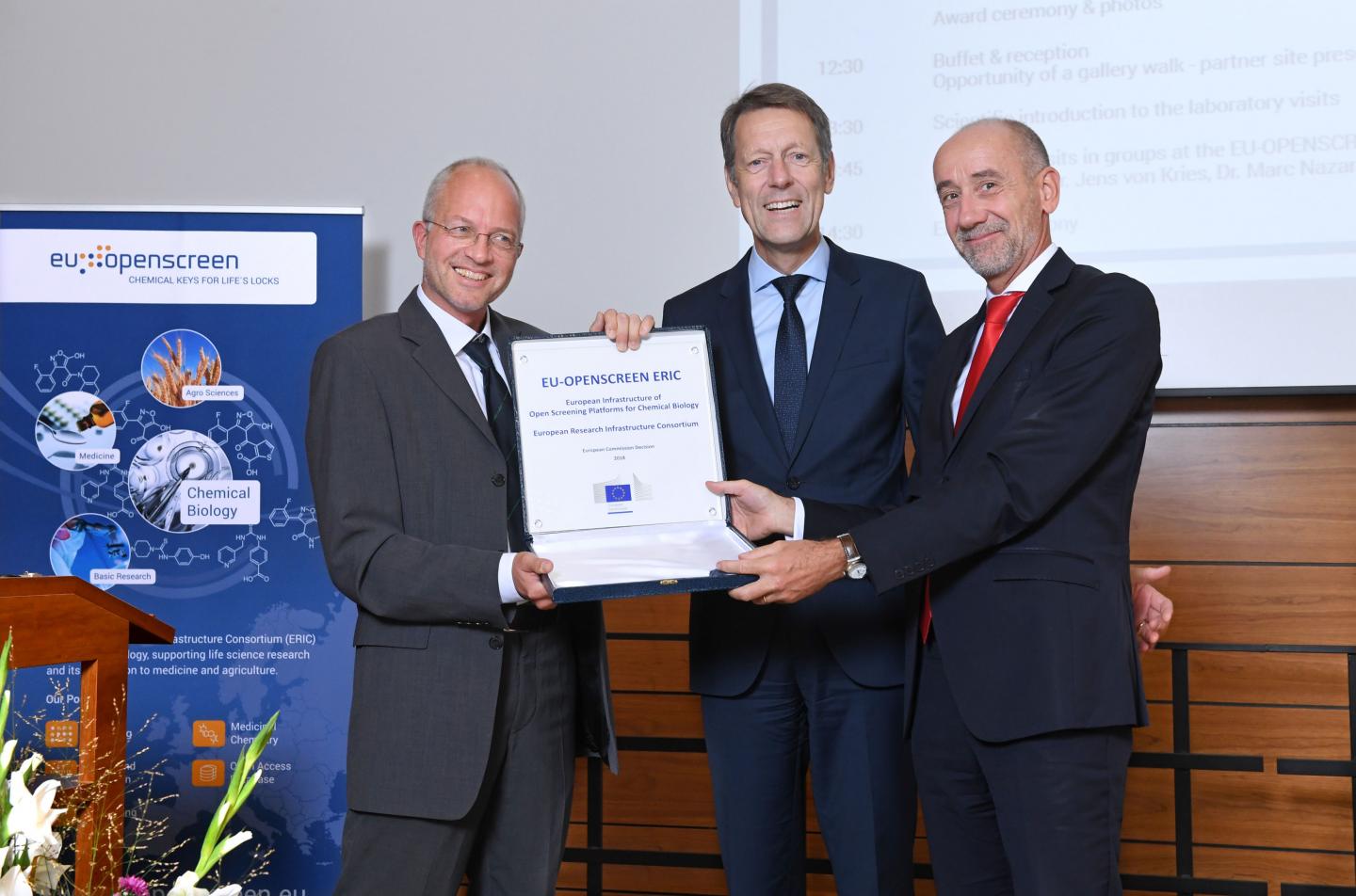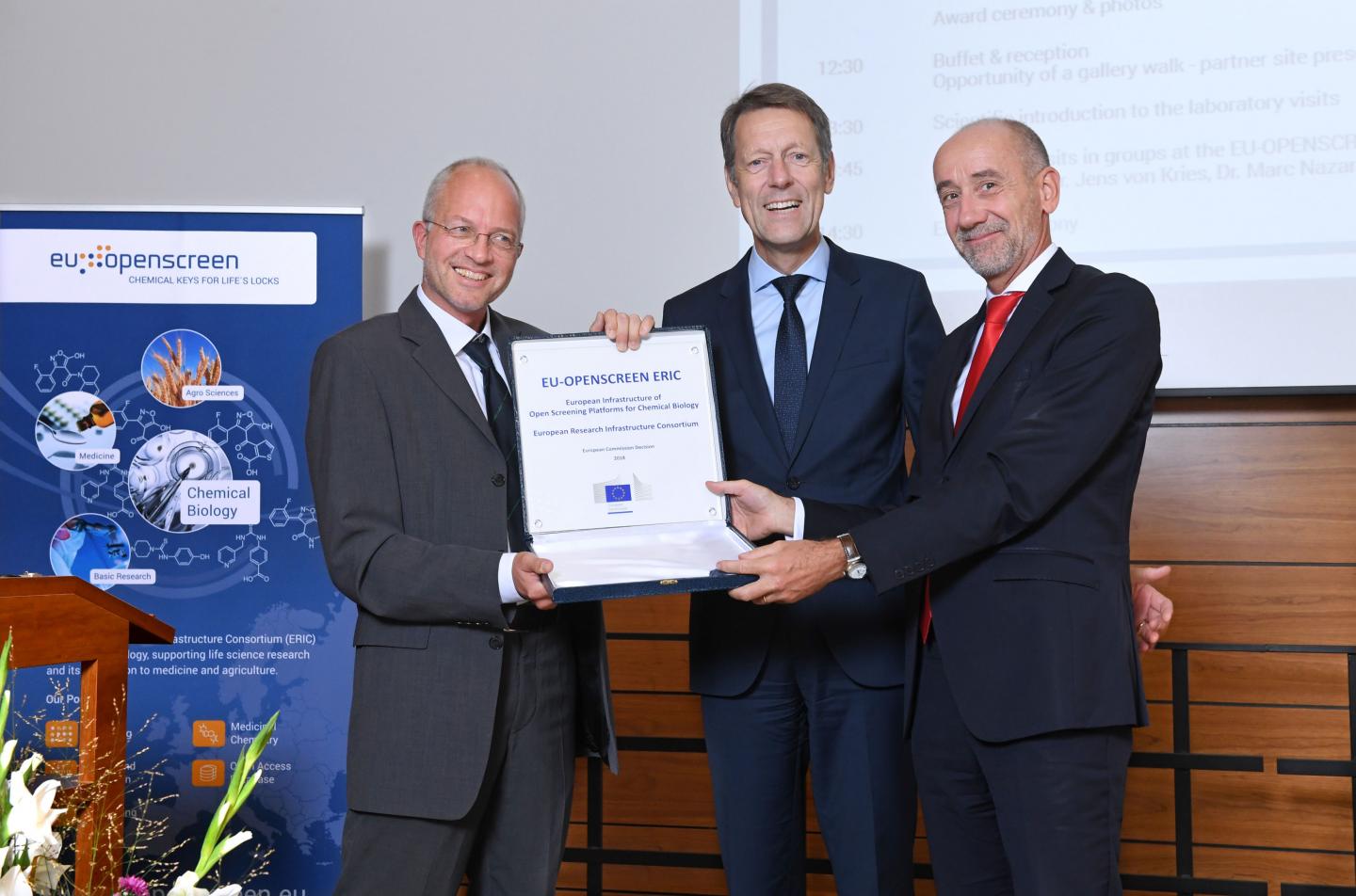
Credit: David Ausserhofer / EU-OPENSCREEN
The European Commission awards the EU-OPENSCREEN consortium the coveted status of European Research Infrastructure Consortium (ERIC). The consortium brings together the infrastructure of 20 research institutes from currently seven European countries. The ERIC certificate is being presented on 25 September 2018 during a ceremony at the Berlin-Buch research campus.
EU-OPENSCREEN offers researchers access to up to 140,000 chemical substances for the purpose of developing new compounds. From now on, the participating institutes, including four from Germany, will cooperate within a legal framework that eliminates regulatory barriers and simplifies access to shared resources. So far, ERIC status has been granted to 21 consortia across Europe, only two of which, including EU-OPENSCREEN, are in Germany.
"Gaining ERIC status represents a special achievement – it will make it much easier for us to cooperate across borders," emphasised Wolfgang Fecke, Director General of EU-OPENSCREEN. Jean-Eric Paquet, Director-General of DG Research and Innovation, will present the ERIC certificate at the ceremony on behalf of the European Commission. Georg Schuette, State Secretary at the German Federal Ministry of Education and Research (BMBF), praised the award: "The BMBF promotes European cooperation in many fields of research. It is especially important in drug research to combine forces and expertise so that urgently required therapies can be developed more quickly and efficiently. As an ERIC, EU-OPENSCREEN is now able to make a greater contribution to these efforts." The BMBF provides around 23 million euros in funding to support EU-OPENSCREEN. This investment is used to expand the central compound library at the Berlin-Buch site and to provide technical equipment to the participating German institutions.
Partner labs can use substances from the compound library to conduct extensive biological assays with cell lines, with thousands of experiments being run in parallel. This screening process enables substances with a specified biological activity to be identified. In order to enhance their activity, chemical methods are used to modify suitable substances in specialist labs. Several rounds of screening and chemical modification may be required in the process. EU-OPENSCREEN ensures that partner labs cooperate smoothly across borders.
A number of EU-OPENSCREEN partner institutes are already working on medical applications. They are planning or have started clinical studies in which new compounds are being tested to treat leukaemia, epilepsy, autism, muscular atrophy, Parkinson's disease, Alzheimer's disease, colorectal cancer and cardiac diseases. There are also opportunities beyond medicine: planned projects include innovative foods and food ingredients, as well as advances in cosmetics and bioenergy.
Germany hosts EU-OPENSCREEN, which is located on the Campus Berlin-Buch. Norway, the Czech Republic, Latvia, Finland, Poland and Spain are the other founding members. Denmark is initially cooperating as an observer, and will become a full member from 2019; seven more countries are preparing their participation. Participating institutes from Germany are the Leibniz-Forschungsinstitut fuer Molekulare Pharmakologie (FMP) and the Max Delbrueck Center for Molecular Medicine (MDC) in Berlin, the Helmholtz Centre for Infection Research (HZI) in Braunschweig, and the Fraunhofer Institute for Molecular Biology and Applied Ecology (IME) in Hamburg.
EU-OPENSCREEN is also well equipped for the future. All four applications it submitted to the EU's Horizon 2020 calls in 2018 were positively received. Over the next four years, therefore, EU-OPENSCREEN will, among other things, coordinate a 5 million euros Europe-wide project involving 33 partners.
###
About EU-OPENSCREEN
EU-OPENSCREEN brings together the resources and expertise of currently 20 research institutes from seven European countries in order to promote the development of new compounds. The consortium was founded in April 2018. The EU-OPENSCREEN Office is located on the Berlin-Buch research campus. http://www.eu-openscreen.eu
Media Contact
Maren Kappe
[email protected]
49-017-782-96097
http://www.fv-berlin.de
Original Source
http://www.fv-berlin.de/news/eu-openscreen-achieves-european-research-infrastructure-status-2013-fewer-barriers-in-the-search-for-new-compounds





